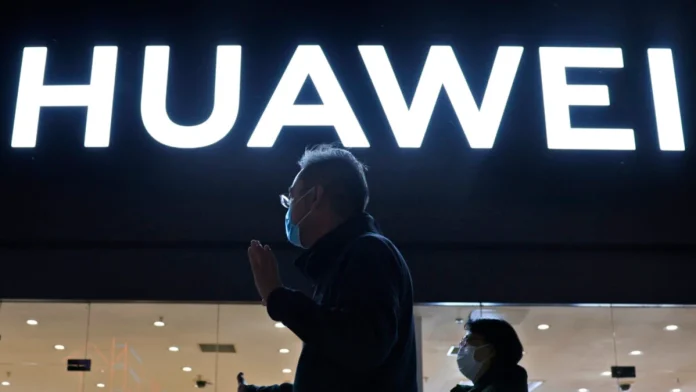WASHINGTON —
The Chinese telecom giant Huawei has consistently claimed it does not actively partner with the Chinese government in gathering intelligence on individuals within China, but a report by The Washington Post this week showing the company appears to have marketed surveillance technology to government customers calls the company’s assertions into question.
The report comes as major parts of the large company’s operations remain severely restricted by sanctions imposed by the United States under former President Donald Trump, which were renewed, and in some cases tightened, by President Joe Biden.
The newspaper obtained more than 100 PowerPoint presentations that were briefly posted to a public page of the company’s website. The trove of documents suggests the company was marketing various surveillance-related services, including voice recognition technology, location tracking and facial-recognition-based area surveillance.
The presentations indicate the company also marketed systems meant to monitor prisons, like those in which China is currently believed to be holding an untold number of Uyghurs in the Western province of Xinjiang. The system tracked prisoners’ labor productivity, as well as their time spent in reeducation classes and data that might indicate the effectiveness of those classes.
Additionally, the materials appeared to market workplace surveillance tools, meant to monitor employees’ workplace performance and to spot workers who spend time resting or using personal electronics on the clock.
Huawei denial
In a statement provided to VOA, a Huawei spokesperson said, “Huawei has no knowledge of the projects mentioned in The Washington Post report.”
It continued, “Like all other major service providers, Huawei provides cloud platform services that comply with common industry standards. Huawei does not develop or sell systems that target any specific group of people and we require our partners comply with all applicable laws, regulations and business ethics. Privacy protection is our top priority and we require that all parts of our business comply with all applicable laws and regulations in the countries and regions where we operate.”
The Post, in its article, noted the company’s official watermark appeared on the pages of the PowerPoint presentation, and that several included a page noting a “Huawei Technologies Co. Ltd.” copyright.
FILE – Mobile network phone masts are visible in front of St Paul’s Cathedral in London, Jan. 28, 2020. Britain is among countries that, because of security concerns, have begun removing Huawei equipment that already had been installed.
Electronic security experts said the revelation of the PowerPoint presentations linking Huawei to state security wasn’t surprising, despite the company’s denials.
“Huawei has been closely linked to the security services from the start,” Jim Lewis, senior vice president and director of the Strategic Technologies Program at the Center for Strategic and International Studies, told VOA.
Lewis said the warnings about the company have been coming from American officials since George W. Bush was president but had not been taken seriously until the past few years, when China became more aggressive about asserting itself on the world stage.
“What’s changed is the audience,” Lewis said. Between China’s and [Chinese President] Xi Jinping’s behavior, people are willing to hear now about the problems with Huawei in a way they weren’t before.”
Punishing sanctions
The United States has, for several years, been warning that Huawei represents a security risk to the interests of the U.S. and its allies. Despite the company’s claims to the contrary, U.S. officials say they believe the company has close ties to Chinese state security agencies and that its telecommunications products could be used to gather information on, or disrupt the activities of, China’s rivals.
Officials also point to a law in China that obligates private companies to cooperate with government agencies in the collection of data deemed important to state security.
In 2019 and 2020, the U.S. began aggressively moving against Huawei on a number of fronts.
The Trump administration fought against the company’s effort to market the networking equipment necessary to roll out 5G wireless technology. 5G is the next generation of mobile connectivity and is expected to greatly enhance the ability of internet-connected devices to communicate, facilitating everything from self-driving vehicles to remote surgery.
The U.S. declared, among other things, it would cease sharing intelligence with allies who allow Huawei to supply critical pieces of their nations’ telecommunications infrastructure, arguing the company presented too much of a security risk.
As a result, a number of countries have barred the company’s technology from their 5G systems and others, including Britain, have begun the expensive process of removing Huawei equipment that already had been installed.
FILE – A smartphone with a Huawei logo is seen in front of an EU flag in this illustration taken Sept. 28, 2021.
Smartphone setback
Until recently, Huawei was one of the biggest sellers of smartphones in the world and enjoyed near-complete dominance in the Chinese market. Other sanctions levied against the company, however, have severely damaged that business.
The U.S. barred firms from licensing or selling the company technology critical to some of its products. That included Google, which in 2019 said it would no longer license its Android operating system — the world’s most popular — for use in new phones made by the company.
Intel and Qualcomm, two major makers of microchips, were banned from selling their most advanced technology to Huawei. The ban extended to contract chipmakers, like Taiwan Semiconductor Manufacturing Corp., the world’s largest.
The result has been a drastic decline in the sale of Huawei smartphones, both globally and within China.
“The core of their devices business was smartphones, and their market share has just continued to decline,” Ryan Reith, a vice president with International Data Corporation, told VOA.
Reith said the prospects for recovery do not look good for the company’s smartphone business.
“We don’t see any way that the brand itself turns around,” he said. “So, it’s probably on its way out.”


